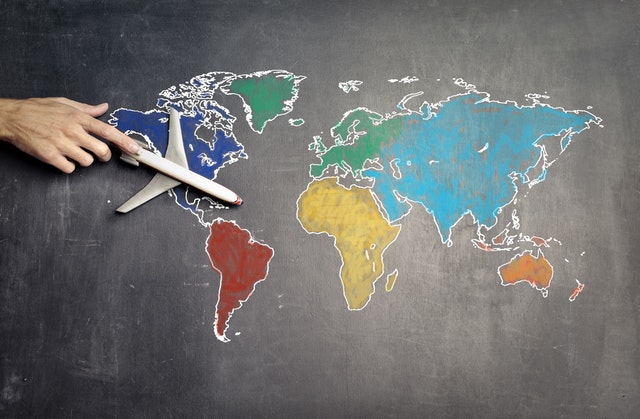International moving is a colossal life change. Once you decide to move to an entirely new county, your mind will probably start creating anxieties you never thought you could have. But don’t worry, this is nothing extraordinary. Human beings tend to over stress in these kinds of life situations. The best strategy is to remain calm as much as possible and to create a realistic moving plan.
The two most common concerns of anyone who is moving overseas are:
- How to make the relocation successful?
- How to save as much money as possible in the process?
Daily hacked will help you with the second one by providing you with some money-saving tips for your international move.
Book your plane tickets on time
Plane tickets can be significantly cheaper if booked early ahead. This is one of the things you don’t want to leave for the last moment, as this can increase your moving costs notably. Alternatively, if you are not in a rush, you can wait for the airline promotions. This way you can buy the cheapest plane tickets there are.

Booking the plane tickets in advance is the first of the money-saving tips for your international move.
Make a thorough categorization of your belongings
Transporting the items that you won’t need after the relocation is costly. Meaning, you are paying to relocate something with no usage anymore. So it’s money gone to waste. Your shoes may tell a story of you, but your story is about to change. Maybe it is time they get changed too. That’s why a thorough categorization of your belongings should be the first thing to do before your move. Divide your items into these or similar categories:
- The high priority items- your absolute necessities
- The second priority items- the items you can go without but that are important to you
- Goods to donate- clothes or utensils that are as good as new but of no use in your future home city
- Goods to sell- the valuables that you no longer require
- Items to keep in storage for some time
- Waste- anything that has no use and is not in shape for selling or giving away
If you have your belongings segregated this way, it is difficult to make the mistake of relocating too big of a load and paying extra for it.
Research moving companies
One of the biggest mistakes you could make when moving is to settle for the first available moving company. Not only could they overcharge you, but you could easily become a victim of relocation frauds. Researching relocation companies is not very difficult nowadays. Just visit a few official moving websites, call a few numbers, or visit them in person. After only a few such analyses, you will get an idea of how the business works and what to expect. So, for example, if the reason for your move is retirement, you have probably researched the best places to retire before you have decided where to go. Similarly, before you commit to a moving company, make sure you have done a bit of investigating.

Nowadays, you can easily check any moving company online.
Get a free moving estimate
Lately, most of the renowned moving companies have features on their sites that calculate moving estimates for free. To decide how much of your belongings you can afford to take, get a free online quote. Or even better, contact your moving company and discuss all the details of your move. This way, you will be in complete control of your relocation expenses. Do a few calculations with various items included, and choose the best offer. After that, you can easily set your limit. Once you have a limit firmly set, there is less space for unplanned expenses.
Put everything on paper
Once you have done your research, categorized items, and decided on the spending limit, put all these on paper. It would be best to do the same with your daily responsibilities. If you take the time to make a schedule and stick to it, your relocation should go smoothly. Planning makes a significant difference. By putting everything on paper, you will dodge the avoidable stress of skipping steps or forgetting something. You will feel reassured that you have all the details of your move prepared. Don’t forget that every successful relocation has various stages and that each of these stages needs to be executed accurately. Careful planning and meticulous notes will help you achieve that.
Leave something behind
It is difficult to leave anything behind when relocating internationally. All the items you possess are, in a way, memories. But sometimes, when you downsize the number of belongings you will take with you, the relocation turns into a much more effective and affordable one.
An example- It might sound complicated and difficult to sell your car and get a new one upon completing your move. However, this might be an excellent money-saving solution.
Try to negotiate a better deal
Besides all the planning and cost-cutting, you can still do more to save money. Relocation prices are not written in stone. If you choose an honest moving company, chances are you will be able to negotiate the final relocation price. Ask them for a discount or which more affordable options they can offer. Do not miss to make a good deal when moving.

Smart negotiation is one of the best money-saving tips for your international move.
Do what you can on your own
One trick of further reducing your moving costs is to do some of the work on your own. It is worth noting that you don’t need to do the tasks completely alone. You can gather a group of friends to help you with packing and labeling. Or, you can clean your future home together with your family members. All these are the additional costs that you can avoid. At the end of the day, it is your move, and you can organize it the way you want.
Maybe you are not that much of a thrifty type after all, and you prefer your relocation perfectly completed, no matter the cost. In that case, you can always hire professionals to do your relocation from A to Z. But, if you are more of a practical type, these money-saving tips for your international move can come in quite handy. In any case, good organization and planning strategies can help in various segments of your life, not only when reducing moving costs.















